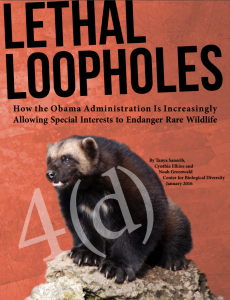Full Title: Lethal Loopholes
Author(s): Tanya Sanerib, Cynthia Elkins, and Noah Greenwald
Publisher(s): Center for Biological Diversity
Publication Date: January 1, 2016
Full Text: Download Resource
Description (excerpt):
The Endangered Species Act (“Act”) is one of the world’s most effective laws for protecting biodiversity, preventing the extinction of 99 percent of protected species and putting dozens on the road to recovery.1 But more and more, the protections of the Act are being fought by powerful special interests, such as big agriculture, the oil and gas industry, developers and ranchers. In recent years, the financial and political influence of industries opposed to wildlife protections has paid off in a little-known way, resulting in the protection of special interests over the protection of imperiled species. In response to political pressure from such special interests, the U.S. Fish and Wildlife Service (“Service”) has used an obscure provision of the Act to subvert the law’s intent and green-light many of the very activities putting species at risk.
The provision of the Act the Service now routinely misuses to sidestep the law’s conservation requirement is named for its place in the statute — the “4(d) provision.” Key to its use is the fact that it applies to threatened but not endangered species,2 a limitation that encourages the Service to protect species only as “threatened,” even when their own scientists recommend they be protected as “endangered.” The 4(d) provision mandates the Service to issue regulations that are “necessary and advisable to provide for the conservation” of threatened species in an effort to prevent them from becoming endangered.3 The clear intent of the provision is to provide the Service with the necessary tools to halt activities that are harmful to the species, such as banning most ivory imports as it did in 1978 to protect African elephants. The 4(d) provision also gives the Service flexibility to authorize activities that do not pose a threat to the species, such as scientific research or catch and release fishing.
